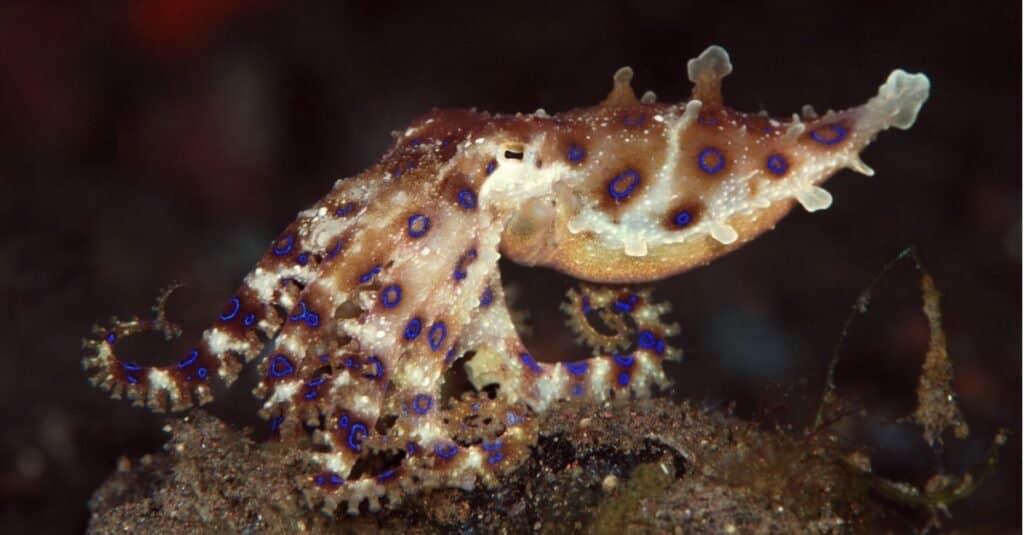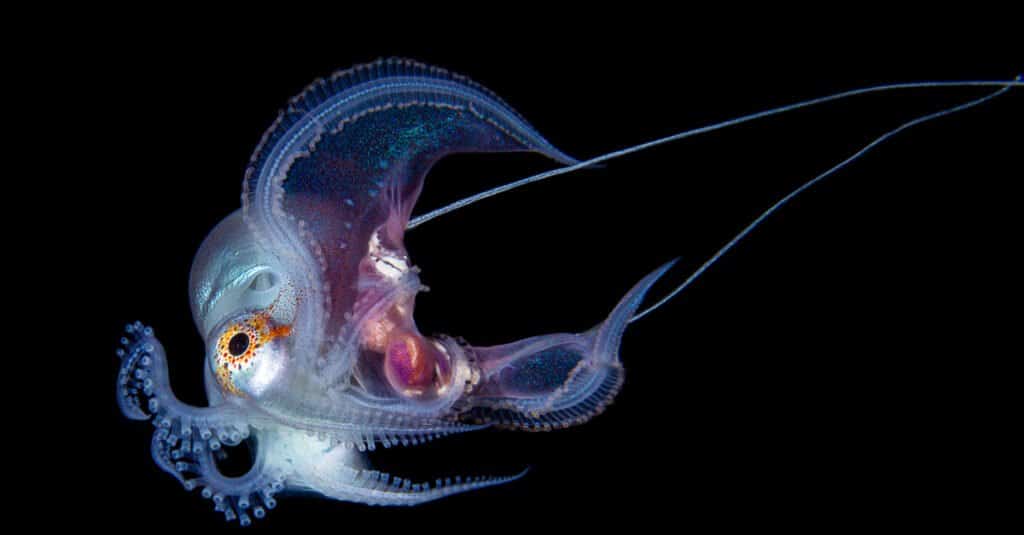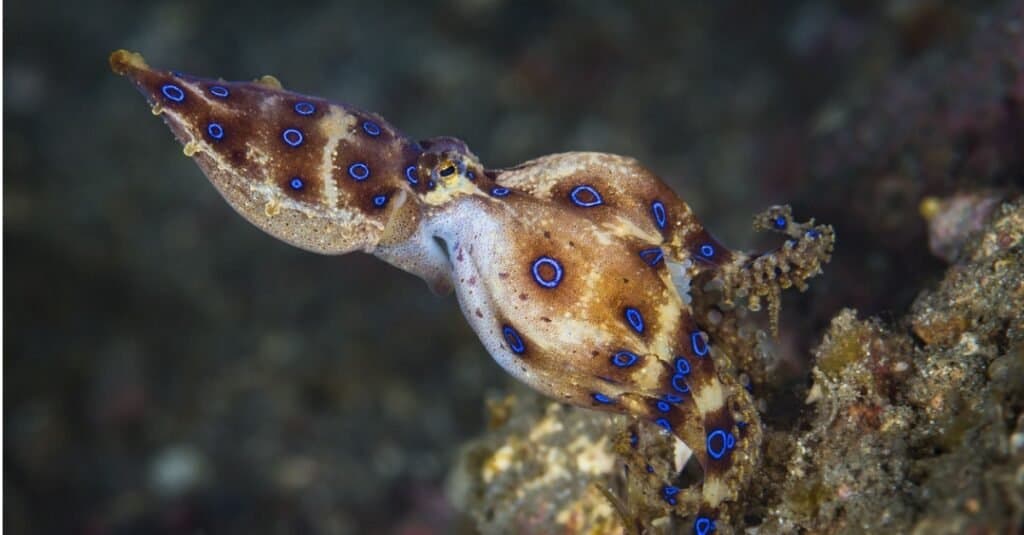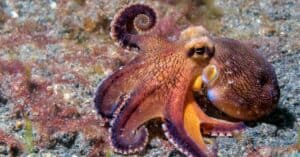Sincerely, watching octopuses on the big screen is fascinating. Still, sometimes, the sight of these sea creatures could funnily scare adults, talk more of children. In general, we will say that octopuses are beautiful tiny sea invertebrates blessed with mini-brains at the base of their tentacles. Intriguingly, they are considered one of the most intelligent sea creatures in the world because of their vision and camouflaging skills.
Are octopuses dangerous? Join us on this ride as we shed more light on things you need to know about these sea creatures.
What Are Octopuses?
Octopuses are any soft-bodied, eight-legged mollusk grouped in the same class Cephalopoda as cuttlefish, squids, and nautiloids. Some shocking yet incredible characteristics include:
- These sea invertebrates have three hearts.
- Surprisingly, they have blue blood.
- Octopuses are one of the ocean’s most brilliant and intellectual characters.
- They are found primarily in Oceans deeps.
- They are one of the oldest sea creatures.
Another fascinating fact is that most species of octopus are nocturnal, so by default, they hunt for their meals at night. At the same time, other opportunistic day feeders forage at dusk and dawn for their meals.
Octopuses are often preyed on by seabirds, fishes, sea otters, etc and like every living creature, they have unique defense mechanisms to defend themselves against predators. One rare defense skill they possess is to eject a dark ink which reduces the efficiency of the predator’s olfactory organs. The ink clouds temporarily confuse the attacker and act as a decoy while allowing the octopus time to swim away.
Are Octopuses Dangerous to Humans?

A blue-ringed octopus’ venom is strong enough to cause asphyxiation.
©iStock.com/DiveIvanov
It is only natural to look at octopuses and conclude that they are delicate, precious, shy, friendly, and gentle when around humans. In truth, no adjective best describes these lovely-looking cephalopods since they are not in the habit of attacking humans, except for self-defense. However, one mustn’t be unwary and unnecessarily comfortable around them. Some species (blue-ringed octopus) can release venom strong enough to cause asphyxiation or swellings in humans.
Stories, tales, and fantasies were often told (to amuse or instill fear in children) of giant monstrous octopuses big enough to attack and swallow an entire ship if they would. But most of those stories never really existed; there were mere tales. Nevertheless, larger living octopuses like the giant pacific octopus found in the northern Pacific Ocean off the United States may be dangerous when their suckers lock onto a human or latch onto a diving gear.
Do Octopuses Bite?

Octopuses deliver venomous bites with their sharp beaks.
©Sam Robertshaw/Shutterstock.com
Octopuses do not have teeth, yet they bite. Yes, you read that right. In place of teeth, these sea creatures have very sharp beaks that are capable of delivering venomous bites and breaking open clams and lobster shells.
Let’s examine the case of a woman who got bitten by an octopus as she posed for a photo contest below:
Jamie Bisceglia, owner of the fishing company South Sound Salmon Sisters and a resident of Fox Island, Washington, sometime in 2019, had borrowed the octopus with the intent of taking photos with it from a fisherman who caught it. Sadly for her, the tale got sour as the octopus sank its beak into her chin twice. After Bisceglia draped the cephalopod on her face, it dug its suckers in and bit her on the chin, causing a painful sensation that sent her to the emergency ward.
She painfully bled for about 30 minutes and experienced swelling in her face and difficulty swallowing two days later.
This gentle-looking creature seemingly looked harmless, soft-bodied, and boneless. But unfortunately for Bisceglia, it possessed hard beaks made of chitin (present in exoskeletons of arthropods like insects, spiders, and crustaceans) hard enough to paralyze her.
You would agree with this true story that although octopuses are fascinating to behold, they can be dangerous when they bite.
Are Octopuses Deadly?

Blue-ringed octopuses produce toxins 1,200 times more poisonous than cyanide.
©iStock.com/RibeirodosSantos
In terms of toxicity, octopuses do not pose so much of a threat to humans. Some octopuses may be poisonous, but only a handful cause actual danger to humans.
Out of the 300 species of octopuses in different oceans around the world, only four species of blue-ringed octopus pose a real threat to humans.
The blue-ringed octopus produces a very deadly toxin containing tetrodotoxin and dopamine. The neurotoxin produced by this deadly octopus is 1,200 times more poisonous than cyanide. To complicate things further, there is no known antivenom for the blue-ringed octopus toxin.
What Would Happen if a Blue-ringed Octopus Bites You?
A piece of advice; do not belittle the blue-ringed octopus.
They might look less significant for their sizes, but a bite from a blue-ringed octopus’ beak may lead to a devastating end. The moment a bite happens, one may not feel any pain; however, the victim can develop muscle paralysis, which gradually graduates into asphyxiation.
Up Next
The photo featured at the top of this post is © iStock.com/izanbar
Thank you for reading! Have some feedback for us? Contact the AZ Animals editorial team.






